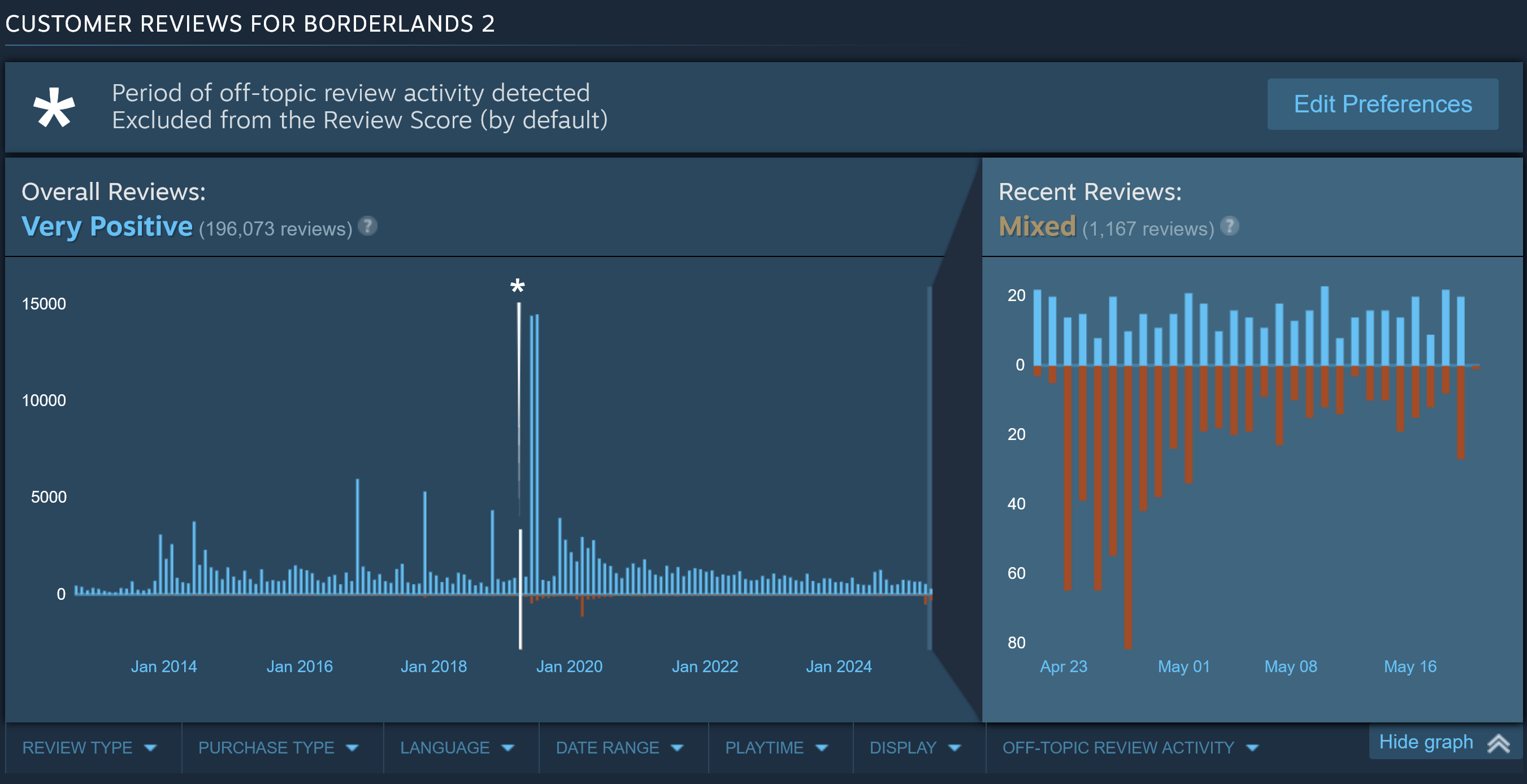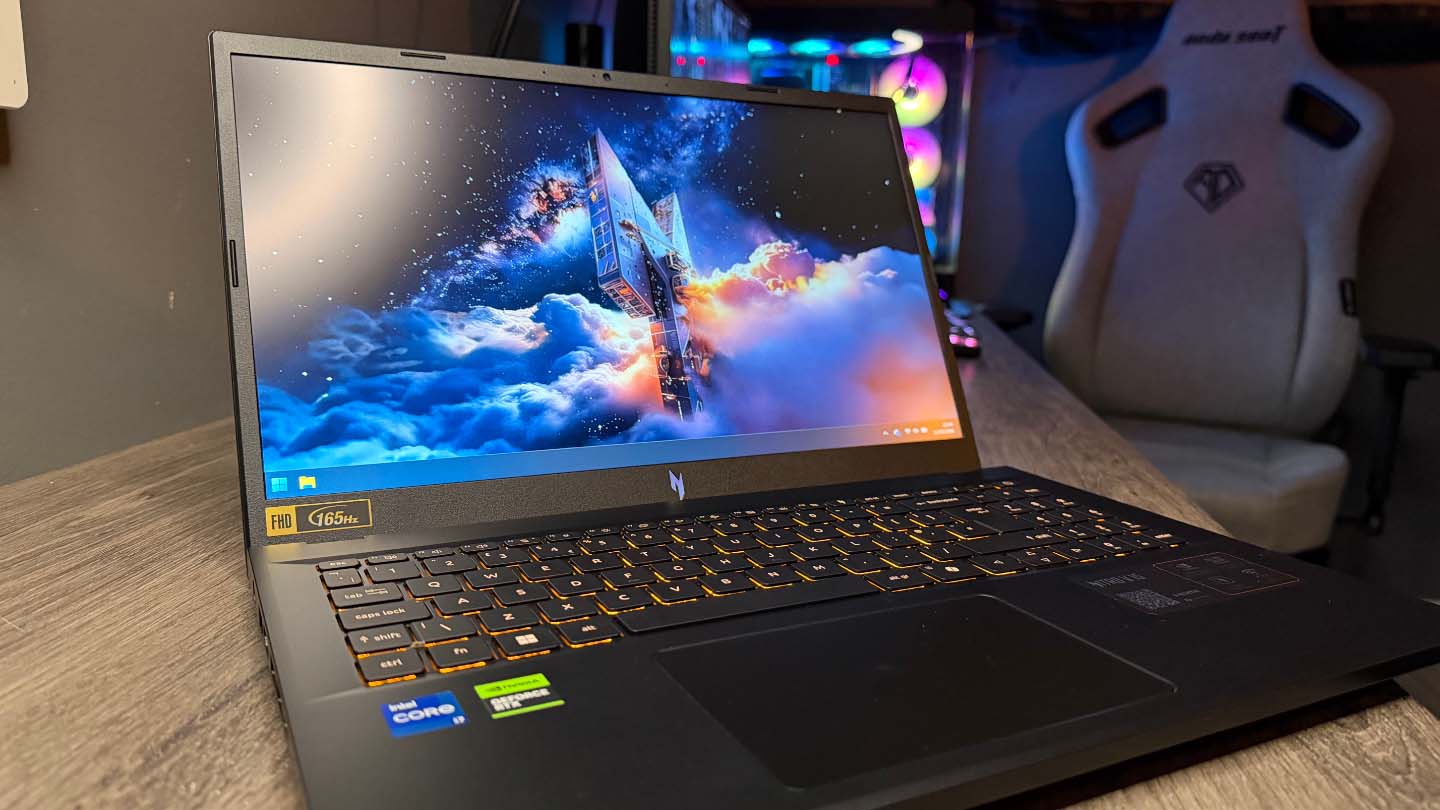Borderlands series briefly review bombed on Steam for extremely flimsy reasons
Complaints about Take-Two's EULA led to a brief surge in negative Steam reviews, but there's nothing exceptional to find in the agreement.

Keep up to date with the most important stories and the best deals, as picked by the PC Gamer team.
You are now subscribed
Your newsletter sign-up was successful
Want to add more newsletters?

Every Friday
GamesRadar+
Your weekly update on everything you could ever want to know about the games you already love, games we know you're going to love in the near future, and tales from the communities that surround them.

Every Thursday
GTA 6 O'clock
Our special GTA 6 newsletter, with breaking news, insider info, and rumor analysis from the award-winning GTA 6 O'clock experts.

Every Friday
Knowledge
From the creators of Edge: A weekly videogame industry newsletter with analysis from expert writers, guidance from professionals, and insight into what's on the horizon.

Every Thursday
The Setup
Hardware nerds unite, sign up to our free tech newsletter for a weekly digest of the hottest new tech, the latest gadgets on the test bench, and much more.

Every Wednesday
Switch 2 Spotlight
Sign up to our new Switch 2 newsletter, where we bring you the latest talking points on Nintendo's new console each week, bring you up to date on the news, and recommend what games to play.

Every Saturday
The Watchlist
Subscribe for a weekly digest of the movie and TV news that matters, direct to your inbox. From first-look trailers, interviews, reviews and explainers, we've got you covered.

Once a month
SFX
Get sneak previews, exclusive competitions and details of special events each month!
A rather sensational YouTube video appears to have set off a mild Steam review bombing directed at the Borderlands series.
In March, Borderlands YouTuber Hellfire posted a video called "Take Two Spies on Borderlands Players," and in it they highlight the differences between the game's original end-user licensing agreements and the new one Take-Two applied to it, which it applies to all of its games.
We should all be vigilant about what's in the EULAs we agree to for our games, as they can contain genuinely objectionable stipulations, but it's also true that the internet has a habit of overreacting to normal terms and conditions. Hellfire spends the bulk of the 16-minute video pointing out things that aren't actually as damning as they seem to think they are.
One of Hellfire's big gripes is that the Take-Two EULA gives the company access to information like your name, username, phone number, IP address, and operating system. This would only be odd if you didn't already hand it that info when you sign up for a Shift account to redeem codes—Take-Two is just listing the information we provide to it, plus information it collects from our browsers. Every website known to man knows this stuff.
The second big point from Hellfire's video is about using mods and cheats. Take-Two's EULA has a clause that states that you can't "use exploits of illegal or unauthorized means to interfere with or adversely impact any other user's ability to use the Servers as intended," which Hellfire claims is bad news for modders all around.
The clause could hypothetically be used to crack down on regular modders, but it seems premature to assume it will be, as the whole section is about interfering with other players and ruining their experience with the game while you're playing online or using cheats to access things like DLC that you don't own.
There's a chance you could get into trouble if you play online with mods, but nothing about this change suggests that Gearbox or Take-Two will suddenly be on the hunt for people using mods or cheats harmlessly, or that its policies have changed. (Take-Two has always had a somewhat uneasy relationship with GTA modders.)
Keep up to date with the most important stories and the best deals, as picked by the PC Gamer team.

The review bombing started when Hellfire released a second video about the topic in April that blew up and received almost 500K views, although it isn't any more convincing than the first video . You can actually see in the recent reviews graphs for each game that the bulk of its negative reviews that cite the EULA changes as their reasoning happened around the release of the video and have since fallen off in the last month.
So what we have is a misleading YouTube video prompting fans to play a game of telephone about the changes to the EULA over Reddit and forum threads, and a bout of short-lived Steam review bombing that hasn't accomplished much of anything.
There are also claims going around that Take-Two is doing all of this because it will implement kernel-level anticheat software into the games—or maybe just Borderlands 4—and will use that anticheat system to steal personal information from its players. The publisher hasn't introduced kernel-level anticheat to any of the games, and if it did, there's nothing to indicate that it would use that anticheat software to steal information from users. There are reasons to be wary of kernel-level anticheat, which is used by other big developers, including EA, Riot, and Activision Blizzard, but Randy Pitchford stealing your Netflix password is not one of them. (The big concern is what would happen if one were compromised.)
It's healthy to be skeptical of the terms offered by big companies like Take-Two, but it isn't clear what the objections are in this case. It's a reminder that Steam review bombing can be used for good just as easily as it can be used for… whatever this was.
Tyler has covered videogames and PC hardware for 15 years. He regularly spends time playing and reporting on games like Diablo 4, Elden Ring, Overwatch 2, and Final Fantasy 14. While his specialty is in action RPGs and MMOs, he's driven to cover all sorts of games whether they're broken, beautiful, or bizarre.
You must confirm your public display name before commenting
Please logout and then login again, you will then be prompted to enter your display name.

